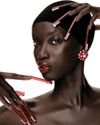
One night a few months ago, I was scouring my usual list of secondhand websites—The RealReal, eBay, Grailed—when I spotted it: a vintage Jean Paul Gaultier top plastered with imagery of cowboys and Native Americans. Sigh. It’s certainly not the first time I’ve seen my Indigenous culture reduced to a kind of gimmick. Growing up Ojibwe on the Nipissing First Nation reservation in northern Ontario, only rarely did I see the beauty of our people and their designs authentically reflected in the fashion world; all too often, we were reduced to caricatures instead.
But I bought that shirt, which now rests in my growing collection of fashion pieces that feature various elements of cultural appropriation. Of course, this isn’t a new concept: Appropriation—in this case, using style cues and motifs from cultures that aren’t one’s own, often without credit and in stereotypical or racist ways—has a long history in fashion. Far more than simply drawing inspiration, designers—often from white or Eurocentric backgrounds—have long mined from minority groups, adopting their underrepresented craftwork or techniques before passing them off as their own. It’s something that can be seen at least as far back as the 18th century with the chinoiserie movement when European designers became fascinated with the motifs found in traditional Chinese dress.
“Appropriation is when you turn something into a costume—like wearing a qipao with chopsticks in your hair,” says Chinese American designer Kim Shui, who incorporates qipao-style collars into her own pieces but has seen other designers plagiarize the style—as well as larger brands pigeonhole entire vast, kaleidoscopic cultures into one specific look and co-opting it. “It’s not coming from a genuine place.”
This story is from the September 2023 edition of Vogue US.
Start your 7-day Magzter GOLD free trial to access thousands of curated premium stories, and 9,000+ magazines and newspapers.
Already a subscriber ? Sign In
This story is from the September 2023 edition of Vogue US.
Start your 7-day Magzter GOLD free trial to access thousands of curated premium stories, and 9,000+ magazines and newspapers.
Already a subscriber? Sign In

SCREEN TIME
Three films we can't wait to see.

Impossible Beauty
Sometimes, more is more: Surreal lashes and extreme nails put the fierce back in play

Blossoms Dearie
Dynamic, whimsical florals and the humble backdrops of upstate New York make for a charming study in contrasts.

HOME
Six years ago, Marc Jacobs got a call about a house designed by Frank Lloyd Wright. Making it his own, he writes, would be about love, commitment, anxiety, patience, struggle, and, finally, a kind of hard-fought, hard-won peace.

GIRL, INTERRUPTED
Anna Weyant found extraordinary fame as an artist before she had reached her mid-20s. Then came another kind of attention. Dodie Kazanjian meets the painter at the start of a fresh chapter

ROLE PLAY
Kaia Gerber is someone who likes to listen, learn, read books, go to the theater, ask questions, have difficult conversations, act, perform, transform, and stretch herself in everything she does. That she's an object of beauty is almost beside the point.

CALLAS SHEET
Maria Callas's singular voice made her a legend on the stage. In a new film starring Angelina Jolieand on the runwaysthe romance continues.

BOOK IT
A preview of the best fiction coming

GLOBAL VISTAS
Three new exhibitions offer an expansive view.

MONDAYS WITH MARC
Just how many Met Galas has Marc Jacobs attended? A few of his favorite guests recount fanciful nights at the museum-past and present.